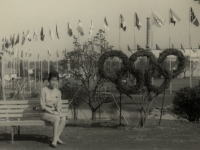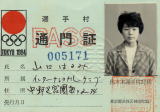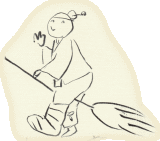Memories of Tokyo Olympic Games
Hi, friends. I am still in the hospital.
I am much better now, and will be out in a few days, I hope.
I can not go out for searching a theme of my July essay,
so I'd like to invite you to come into my memories of youth.
|
40 years ago. It was 1964, the year of Tokyo Olympic Games.
I was 20 years old, a sophomore in Sophia University in Tokyo. Our school
campus was quite near to the Olympic Stadium in Yoyogi. I was an English
major, and I applied for a work as a translator in the International Club
in the Olympic Village where the attendants stay during the
 |
| In the Olympic Village |
Games. I was there for almost two months, from one month ahead of the Opening Ceremony until a week after the Closing Ceremony. My job was just sitting at a table at a corner of the International Club, to answer the questions like: Where to buy SONY, SEIKO, NIKON, MIKIMOTO, or, how to get to the Ginza, Kyoto or other cities. Some people wanted to buy Japanese Kimonos. Others wanted to eat Sukiyaki, Sushi, or Tenpura. In the village, there were mostly any kind of shops necessary for the daily life. Restaurants, coffee-shops, ice-cream stands, post-office, banks, clinics, laundry, fruits, cakes, etc. Buses were going round this way and that with a slow speed. No bus-stops. You could get on and off at any place. Many bicycles and umbrellas were at hand.
Milk was served free in the Club sponsored by some major milk companies.
Every morning many players came there to have some milk and some chat.
In the evening, they could dance there, too. A huge jukebox was settled,
and all the Beetles songs were playing whole day. It was a little before
The Beetles became explosively popular in Japan.
Since I had to stay there, I could never go to the Stadium. Only the TV
set was showing the games. There I met so many wonderful people from all
over the world. Among them there were some special persons I could never
forget.
Two young gentlemen from Congo
I don't remember the spelling of their names so I may be mistaken. One
was Yonbe, a real black stout person. The other was Uranda, brown and very
tall. Both spoke English very well beside French. We became good friends
and enjoyed conversation. Both were runners. short distance and middle.
They were in their middle twenties, I guess.
They came to the International Club earlier than anyone else. Drinking
the free milk many times, they spent a long time until night. Almost everyday
they were there. They smiled and greeted and talked to the people from
other countries. It seemed to me that they were not exercising at all.
When there were no other people in the club, they made jokes on me and
treated me like a small child. One held and threw me like a ball, and the
other caught me. I screamed and they laughed. We had a good time together.
One day I asked them a question which I dared not ask before.
"Why don't you go to the Stadium? Are you training at all? When is
your race? "
They smiled and said, "We do not need to. We have already dropped
out."
"Oh, that is too bad. I 'm sorry", I said.
They said, "Don't be sorry, because we are not sorry ourselves. It
is not bad at all."
I was puzzled. "You two are the first Olympic attendants since your
country got independent. Your nation must have had much anticipation for
the medals, I suppose. Don't they blame you?"
Yonbe laughed and said. "Our country knows that we are not the fastest
runners. Even my younger brother runs faster than I ."
I was more surprised.
Uranda explained quietly.
"Our country is a new country. It cannot afford a big, strong mission.
So we were selected not only as runners, but also as diplomats, since we
are students studying in Paris by the government's money, and can behave
ourselves as gentlemen among people from all over the world. Our duty is
not to win, but to introduce our country to the world, and start a friendship.
So here in this club, we are talking to as many people as possible. This
is our challenge. We are trying our best."
Their faces looked quite proud. I was moved. "Oh, you both are wonderful ambassadors," I said, "I think I like your country very much by knowing only two people."
I can not forget their shining smiles in the camp-fire at the closing party
of the Village.
These two gentlemen must have become big, important leaders in their country.
I have not heard about them since then, though.
Vera, the Queen of Tokyo Olympic
Of course you remember the name "Vera Chaslavska of Czechoslovakia",
don't you?
Newspapers were telling much about Vera. She had the highest reputation
among many other stars of every sport.
The Olympic Village in Yoyogi was a separated colony, circled by fence,
with some gates through which only passport-holders could get in. I had
a passport which showed that I
 |
| My passport to the Village |
belonged to the International Club. In the big fence of the Village, there
was a smaller fence circling women's dormitories. The International Club
served as the entrance hall to the women's area. Men were allowed here
in the Club, but not further.
Vera walked in and out before my desk every morning. I was happy to see
her, and said, "Good morning, Miss Chaslavska." But she never
answered. She didn't even looked at me. Around her, there always were three
or four women with strong faces, and they gazed at me with cold eyes.
After trying some times, I stopped to greet her. I was hurt. I was disappointed.
Only to the press, I thought, Vera was smiling beautifully.
Some days later, one of my senior translators came to see how I was doing
my job. In our conversation I mentioned Vera's cold attitude. I said, "I
think she is a little arrogant. A real Queen would smile at ordinary people."
My senior translator shook her head and said. "Those ladies around
her are not her servants. They are police watching her. Vera is one of
the dangerous persons politically for their country. Their government do
not want Vera to have contacts with others. They could not help sending
her to the Olympic Games because the world had known her."
I was shocked. How ignorant I was! I was ashamed of myself. I was so sorry
for Vera.
 |
| Vera at Tokyo Olympic |
Vera took three gold medals in spite of the unimaginable pressures. In
TV and papers, her smile was most noble.
In 1968, Soviet Russia moved their tanks into Praha. Many citizens died. Vera hid herself in the mountainside, and practiced on trees and ropes by herself. Only two months later, Vera got 4 gold medals in the Olympic Games in Mexico, defeating her rival of the enemy country.
But soon after her glory, her hardest time began. It continued for 20 years
until the revolution of 1989. Then she appeared herself again. She helped
the new leader of the country, President Havel.
One day I saw her on TV. Her smile was as noble and beautiful as before.
I was most happy to know that she had survived her winter.
These are some pieces of my cherished memories of Tokyo Olympic.
I am glad that you are so kind to listen to me and share them.
Thank you, and I hope you will enjoy the Olympic Games in Athens.
In this world of terrors and wars, can Olympic help something?
|
|
|




